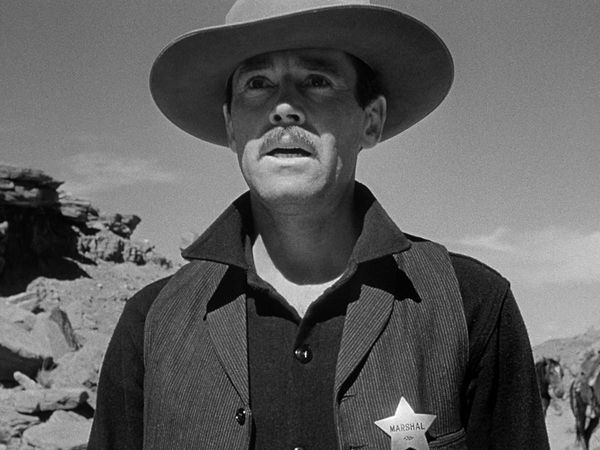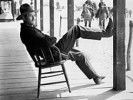Eye For Film >> Movies >> My Darling Clementine (1946) Film Review

John Ford had a talent for ordinariness, despite a penchant for iconic leading men. He liked to drag everyone up to the same level, so that a bit player had the same standing as a supporting actor. His Westerns, without exception, are so rich in character there is infinite pleasure in the detail.
My Darling Clementine isn't a frothy rom-com, with musical interludes, as the title suggests, but the story of Wyatt Earp, Tombstone and the gunfight at the OK Corral. It wears the accolade of Classic Western with nonchalant ease. Unlike later incarnations (Kevin Costner, Kurt Russell, Burt Lancaster), there is nothing showy about Henry Fonda's Wyatt. He is the ex-marshal of Dodge City, now a cattleman who takes the job that no one wants - marshal of Tombstone, a rowdy, dangerous, uncontrolled frontier town - because his cows have been rustled and his 18-year-old brother murdered and he's doggone gonna find the men responsible.

Unlike another landmark Western, High Noon, the climactic showdown is not what the film is about and if you compare My Darling Clementine with John Sturges's monumental Gunfight At The OK Corral 11 years later, it may appear dramatically weakened by a casually choreographed shootout, culminating in Wyatt's extraordinary generosity towards Boss Clanton (Walter Brennan).
Victor Mature, who would go on to become a Fifties heartthrob in such sand'n'sandals epics as Samson & Delilah and The Robe, is a very creditable Doc Holliday, the consumptive alcoholic, whose self loathing creates its own destructive legacy. The film belongs to Fonda as much as the entire cast. Wyatt's modest authority, based upon an independence of spirit that respects, rather than condemns, the weakness in others is Fonda's forte and he is magnificent here.
This is prime Ford, a perfect example of his understated humanity, with a crackling script (Sam Engel, Winston Miller) that doesn't waste breath ("When you pull a gun, kill a man!" Boss Clanton rebukes one of his sons), or let a good line go to waste ("Mac, have you ever been in love?" "No, I've been a bartender all my life").
Reviewed on: 06 Mar 2006
















